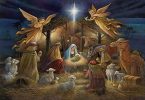19th Sunday of Ordinary Time (Vianney Sunday)
Scripture reading: 1 Kings 19: 9, 11-13; Ps. 89:9-14; Rom. 9:1-5; Mt. 14:22-33
There was a boy who shared a good relationship with God; every time he would talk to God, pray to God. Once, they were walking along the seashore. The boy noticed two pairs of footprints on the sand. God assured the boy of His presence. All of sudden there was a storm and the boy was walking on the stones and thorny shore. He was all the more afraid of what would happen to him. So he started asking God, “Where are you? Why did you leave me?” God replied back to him, dear friend, why do doubt that I have left you? I have not left you rather the footprints that you see are not yours but they are mine. I have taken you in my bosom and I have kept you close to my heart. So that you may not perish but may live a happy life. Is there anyone in this world who has not experienced hardships? Everyone faces difficulties in life. In all these circumstances, God is in total control of everything.
In today’s liturgy, we find every reading tracing the fact that although each figure went through suffering, yet God was in total control of their life. In the first reading, the prophet Elijah lived during the time of King Ahab. He had married a pagan princess, Jezebel by name. influenced by her way of life, Ahab and his people left Yahweh and began to worship Baal, a pagan god. As a punishment of the sins, the prophet announced a terrible drought. It lasted for three and a half years. During this time, the prophet Elijah took the opportunity to challenge the king and the pagan priests. A victim was placed for sacrifice in honour of Yahweh and the pagan god. A crowd witnessed Elijah’s victim consumed by fire but the pagan priests could not. They pounced on those 400 pagan priests and slaughtered them. The revengeful queen swore to kill Elijah. He ran for his life and hid on the Mount Horeb, which was another name for Mount Sinai. The queen’s soldiers went on a hunt to kill Elijah. Elijah wanted to die, but God came to him in an ordinary event to meet him.
In the second reading, St. Paul is also frustrated when the Jews rejected Jesus as the saviour of the world. He explains to them that everything is summarized in Christ. He tells them that God had built a bond with them from the days of the patriarchs Noah, Abraham and Isaac. He explains the law and the prophets. Jesus is the promised Messiah, the Christ, the anointed one. Paul expressed deep hurt when the Jews as a nation did not accept Jesus as the anointed one. Yet it in the midst of his frustration, Paul always felt that the Lord was close to him. Jesus had total control over his life. Therefore, he said to the Philippians, “Do not be anxious about anything, but in every situation, by prayer and petition, with thanksgiving, present your request to God. And the peace of God which transcends all understanding will guard you and your minds in Christ Jesus” (Philip. 4:6-7)
In the gospel, we heard last Sunday the feeding of the five thousand men besides women and children. The apostles were exuberant. Jesus left them to go ahead to the other side while going to a lonely place to pray. All of a sudden there was a storm and their boat was battling the rough sea for there was a heavy wind. The apostles were in danger. They were perhaps thinking of Jesus who could have saved them from the situation. Jesus came to them at the fourth watch. It is very symbolic to know what happened at the fourth watch in the lives of Israelites. Jacob wrestled with God face to face. (Gen. 32:22-31). Moses led the Israelites across the red sea (Ex. 14:25-26). The angels appeared to the shepherds to announce the birth of Jesus. (Lk. 2:8-14). Jesus is resurrected from the dead and meets Mary Magdalene and other women. (Mt. 28:1). In today’s Gospel, Jesus walked towards the disciples. The fourth watch indicated God’s presence. Jesus was present in the midst of a storm. When Peter showed little faith in Jesus while walking on the water, he was drowning; yet Jesus did not leave Peter. Jesus is total control of our lives especially in the midst of hardship and turmoil.
We are celebrating Vianney Sunday today, St. John Marie Vianney also had difficulties in his life. He was born in a time of turmoil. The French Revolution and Napoleon Bonaparte had impacted the minds of the people. People had lost the taste of religion and of God. In his life, he had to face a number of difficulties. Being a Frenchman, he didn’t know the Latin language which made his priestly studies difficult. The authorities did not understand him so they sent him back home. Once he was ordained, he was sent to a difficult parish.
All these figures had difficulties in their lives just like us. There is not a single person who doesn’t have difficulties in life. Sometimes, we are caught in the storms of sickness, death, economic problems, religious crises, psychological problems and now in the deadly pandemic.
We can learn one lesson from Prophet Elijah, St. Paul, St. Peter and his companion and St. John Marie Vianney. In the storms of life, they fixed their eyes on God and Jesus. We too are called to fix our eyes on Jesus. Jesus is in total control of our lives, especially in hardships and turmoil. We need to have faith like Elijah who prayed to consume the victim of sacrifice; St. Paul was ready to give up his life to prove that Jesus is the Messiah of the Jews; St. Peter called on Jesus, “Lord, save me.” St. John Marie Vianney spent hours before the blessed sacrament and in the confessionals to adore the Lord.






